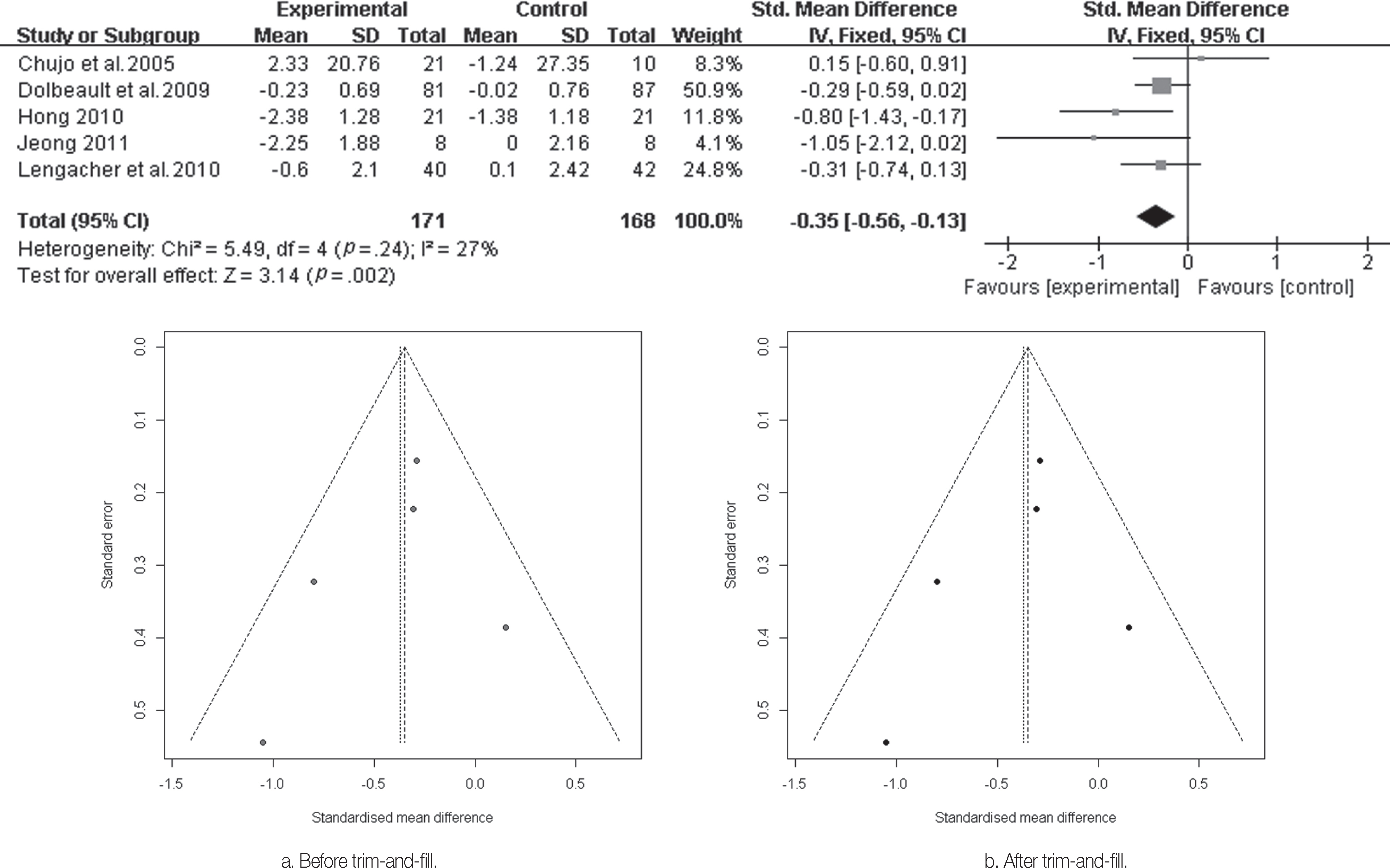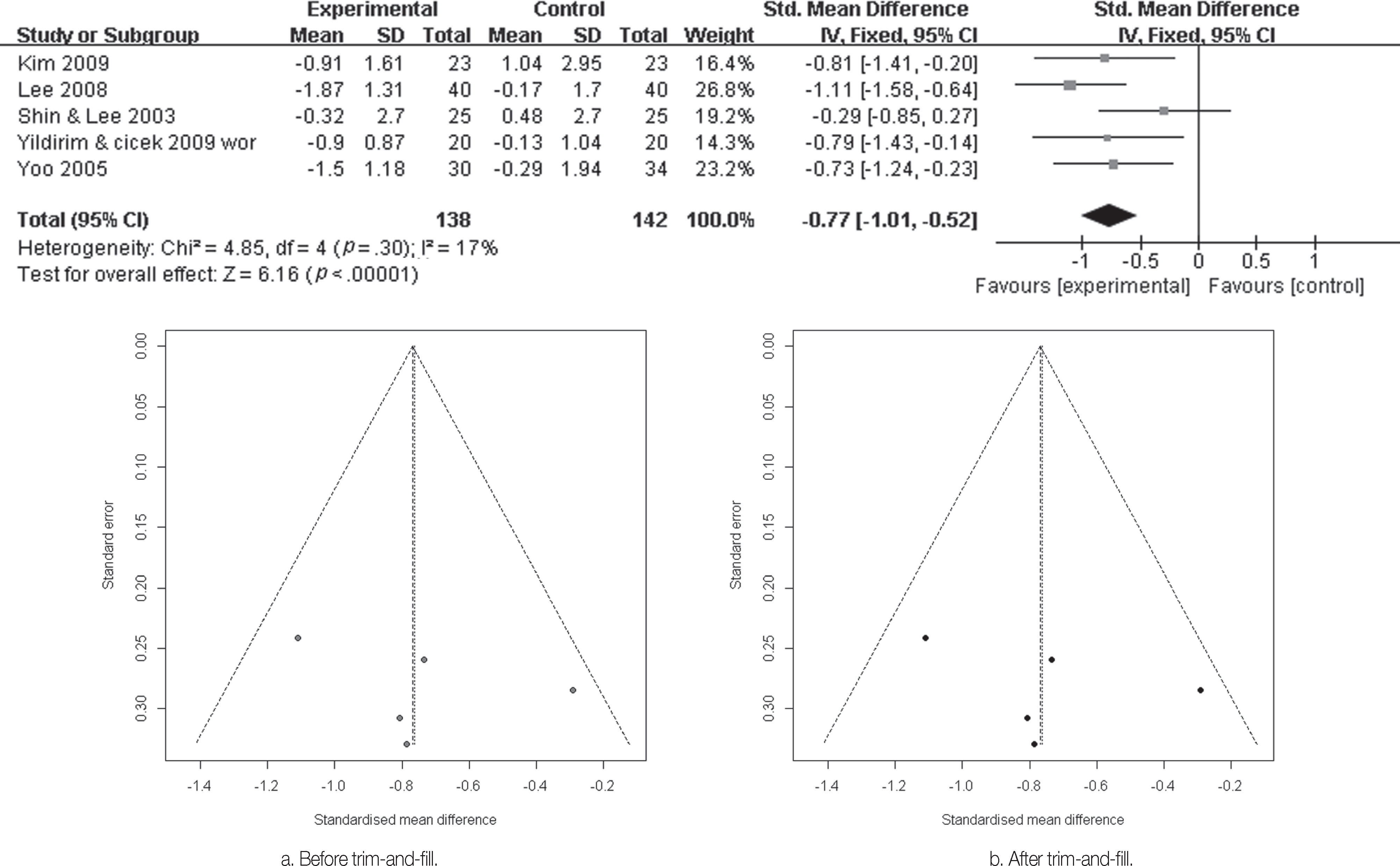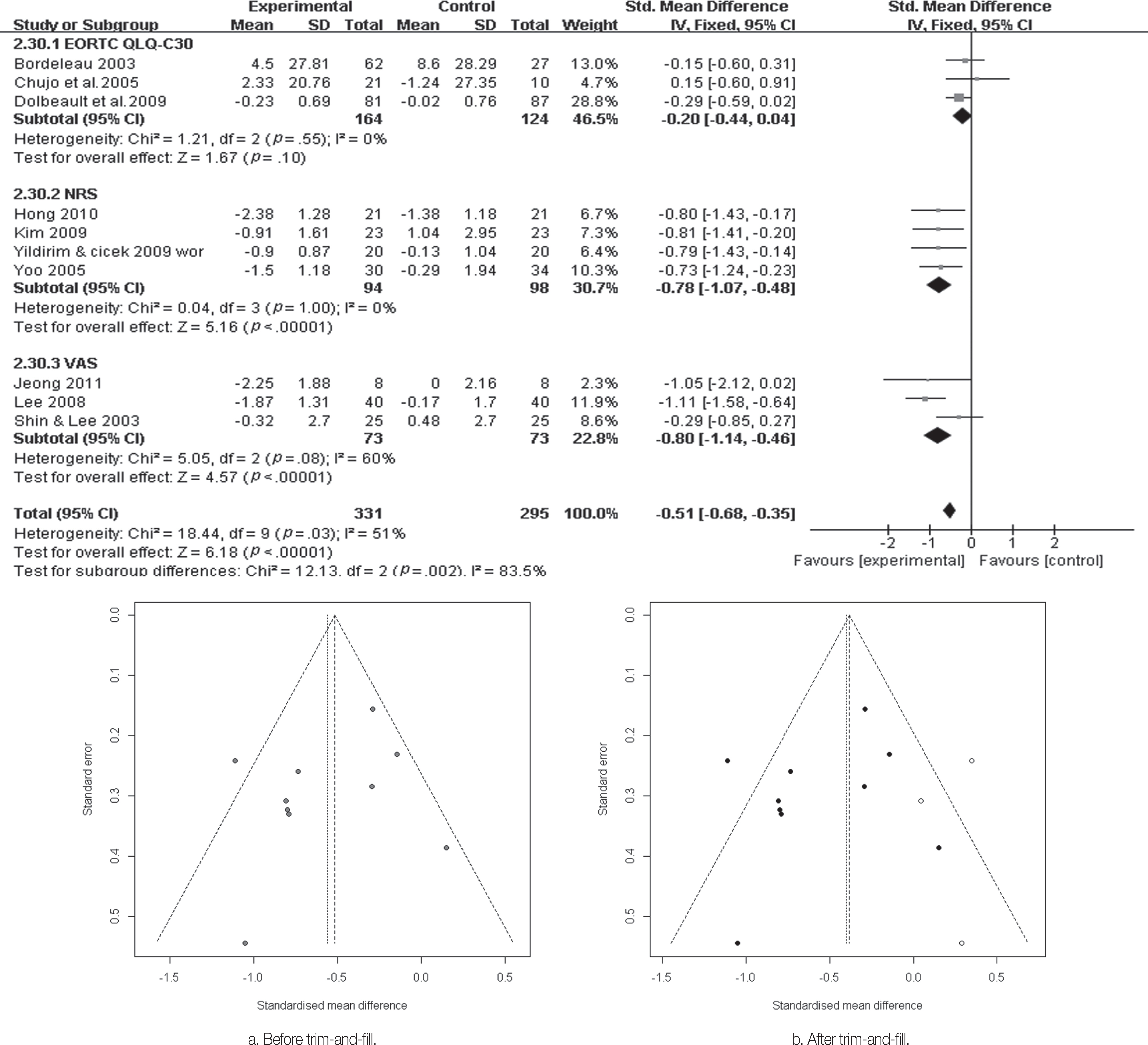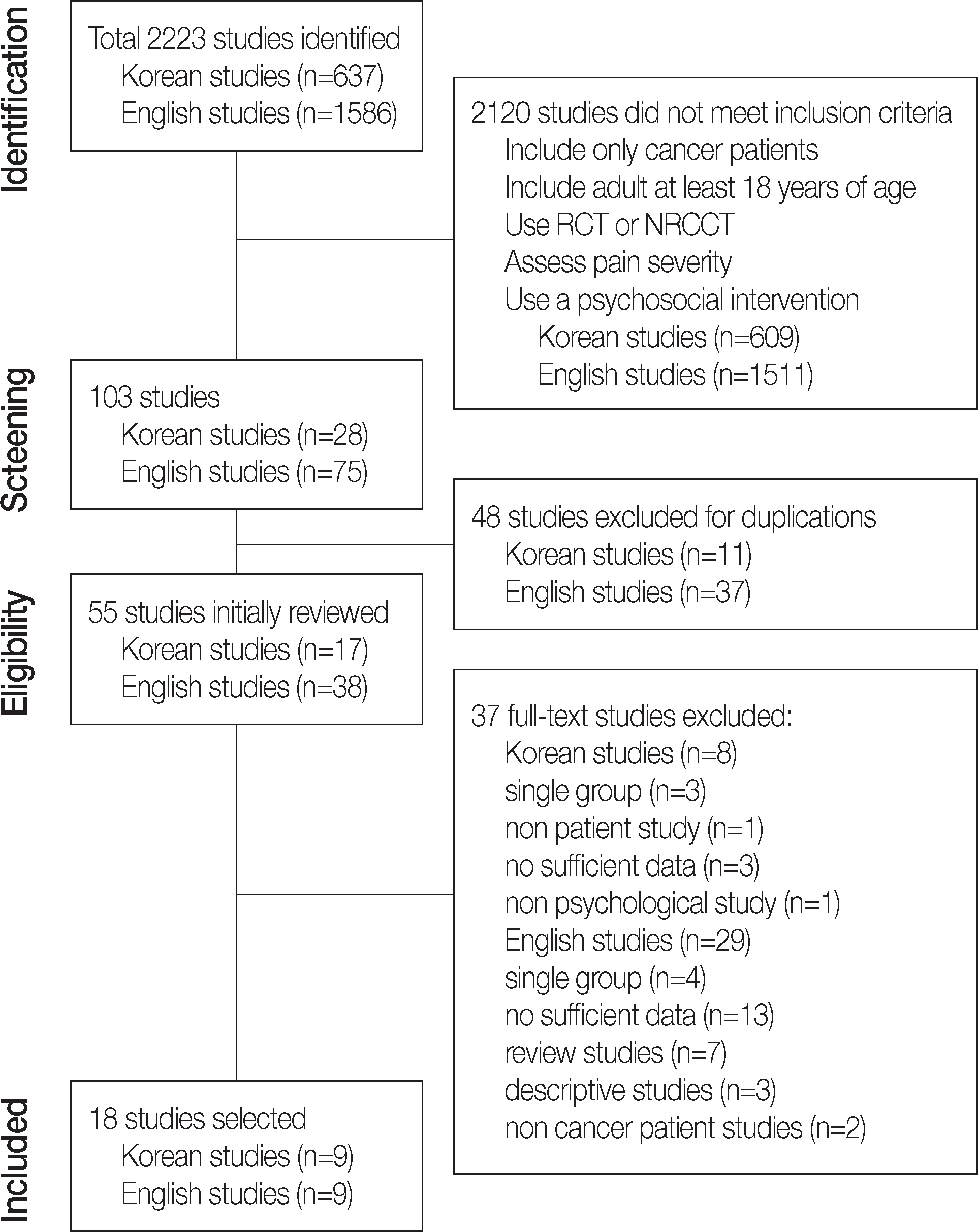Articles
- Page Path
- HOME > J Korean Acad Nurs > Volume 43(5); 2013 > Article
-
Original Article
- Meta- analysis of Psychosocial Interventions to Reduce Pain in Patients with Cancer
- Pok Ja Oh, Suk Jung Han
-
Journal of Korean Academy of Nursing 2013;43(5):658-668.
DOI: https://doi.org/10.4040/jkan.2013.43.5.658
Published online: October 15, 2013
Department of Nursing, Sahmyook University, Seoul, Korea
Department of Nursing, Sahmyook University, Seoul, Korea
- Address reprint requests to : Oh, Pok Ja Department of Nursing, Sahmyook University, Hwarangro-815, Nowon-gu, Seoul 139-742, Korea Tel: +82-2-3399-1589 Fax: +82-2-3399-1594 E-mail: ohpj@syu.ac.kr
Copyright © 2013 Korean Society of Nursing Science
This is an Open Access article distributed under the terms of the Creative Commons Attribution Non-Commercial License (http://creativecommons.org/licenses/by-nc/3.0) which permits unrestricted non-commercial use, distribution, and reproduction in any medium, provided the original work is properly cited.
Abstract
-
Purpose
- The purpose of this study was to investigate the effects of psychosocial interventions on pain in cancer patients.
-
Methods
- Eight studies published between 1980 and 2012 in Korean and ten studies published between 2002 and 2012 in English met the inclusion criteria with a total of 1539 participants. Methodological quality assessed by Cochrane's Risk of Bias for randomized studies and Risk of Bias Assessment tool for non randomized studies. The data were analyzed by the RevMan 5.2 program of Cochrane library.
-
Results
- Overall, study quality was moderate to high. Effect sizes were heterogeneous and subgroup analysis was done. Cognitive behavioral therapy (CBT) were effective for pain (ES= -0.35; 95% CI= -0.56, -0.13). Pain education studies measured with NRS and VAS were effective for pain (ES= -0.77; 95% CI= -1.01, -0.52). Publication bias was not detected.
-
Conclusion
- This study support the use of psychosocial interventions administered to cancer patients for their pain management. However, more well-designed studies are needed.



| References | Sources | Designs | Subjects (stage/analgesic) | Sample sizes | Interventions | Outcomes (Timing of measurement) | Scale | Direction of effect | ||
|---|---|---|---|---|---|---|---|---|---|---|
| Exp. (n) | Cont. (n) | Name/type | Weeks/Number of Sessions/Min | |||||||
| Bordeleau (2003)* | Journal (non-nursing) | RCT | Metastatic breast cancer (unclear/unclear) | 80 | 36 | Supportive-expressive therapy/ group | 48/48/90 | Pain severity (4,8,12 min) | Symptom subscales of EORTC QLQ-C30 | No diff. |
| Chujo et al. (2005)¶ | Journal (non-nursing) | ) NRCCT | Breast cancer patient (recurrence/unclear) | ) 19 | 9 | Psychosocial group intervention/ group | 6/6/90 | Pain severity (immediately, 3,6 min) | EORTC QLQ-C30/ Br23 | No diff. |
| Dolbeaul (2009)* § | Journal (non-nursing) | RCT) | Cancer patient (ealry/unclear) | 81 | 87 | Psycho-educational group/group | 8/8/120 | Pain severity (immediately) | EORTC QLQ-Br23 | − |
| Goung (2003)¶ # | Master's (nursing) | NRCCT | Stomach cancer (terminal/narcotics) | 32 | 32 | Pain control education/ individual | 1/1/30-40 | Worst/Least/mean/ present pain (1 wk) | BPI-K | −/No diff./ -/No diff. |
| Hong (2010)¶ # | Master's (nursing) | NRCCT | Colon cancer patient (unclear/PCA) | 21 | 21 | Recovery nursing intervention/ individual | 4/4/30-40 | Pain severity (immediately) | NRS | − |
| Jeong (2011)¶ # | Master's (psychology) | NRCCT | Cancer patient (unclear/no | 8 | 8 | MBSR/group | 8/8/90 | Pain severity (immediately) | PPI/VAS | −/- |
| analgesics) | ||||||||||
| Kim (2009)¶ ** | Master's (nursing) | NRCCT | Cancer patients (3,4/narcotics) | 23 | 23 | Pain management education/group | unclear/9/30 | Analgesic use/ pain severity(1 wk) | BPI-K/NRS | +/- |
| Kroenke et al. (2010)‡§ | Journal (non-nursing) | ) RCT ( | Cancer patient (unclear/analgesics) | ) 137 | 137 | Telecare management | 12/3/ unclear(phone) | Pain severity (1,3,6,12 min) | BPI | − |
| Kwon, Whang, & Kim (2002)¶ ** | Journal (nursing) | NRCCT | Home cancer patient (terminal/unclear) | 16 | 16 | Pain management education/ individual | 1/1/30 | Pain severity (2-3 wks) | Patients Outcome Questionnaire | − |
| Lai et al. (2004)§ | Journal (nursing) | RCT | Cancer patient (2-4/unclear) | 15 | 15 | Brief pain education/group | 1/5/10-15 | Pain severity (immediately) | BPI-T | − |
| Lee (2008)¶ ** | Master's (nursing) | NRCCT | Gastric Cancer Patient (unclear/PCA) | 40 | 40 | Structured PCA education/ individual | 1/1/20 | Analgesic use/ pain severity (1 wk) | VAS | − |
| Lengacher et al. (2010) | Journal (nursing) | RCT | Breast cancer patient (0-4/unclear) | 40 | 42 | MBSR/group | 6/6/120 | Pain severity (within 2 wks) | MDASI | − |
| Shin & Lee (2003)¶ # | Journal (nursing) | NRCCT | Cancer patient (unclear/no drug) | 25 | 25 | Cancer pain management education/ Individual | unclear/unclear/ 20-30 | Pain severity (2 wks) | VAS | No diff. |
| Thomas et al. (2012)* †‡ | Journal (nursing) | RCT | Cancer patient (unclear/unclear) | Coach: 64 Education: 75 | : 88 | Education or motivational-interviewing–based coaching/group | 6/4/30(coaching, education-video) | ,) Body pain (6 wks) | BPI | No diff. |
| van der Peet et al. (2009)§ | Journal (nursing) | RCT | Cancer patient(unclear/pain score of 4 or higher) | 39 n | 44 | Intensive nursing-based pain education program/ individual | / 3/3/60-90 | Pain severity (4, 8 wks) | Ferrell's pain questionnaire | −/No diff. |
| Yates et al. (2004)†§ | Journal (nursing) | RCT | Cancer patient (unclear/unclear) | 87 | 79 | Pain management intervention/ Individual | 1/2/30 | Pain severity (1, 8 wks) | BPI | − |
| Yildirim & Cicek (2009)§ | Journal (nursing) | RCT | Cancer patient (unclear/unclear) | 20 | 20 | Pain education program/ individual | 3&7days/ unclear/ 30-40 | Present pain/worst pain/least pain (2, 4, 8 wks) | MPQ/NRS | −/No diff./- |
| Yoo (2005)¶# | Doctoral (nursing) | NRCCT | Lung cancer patient (unclear/unclear) | 30 | 34 | Web based education program/ individual | 1/1/15 / | Pain severity (3 wks) | NRS | − |
Exp.=Experimental group; Cont.=Control group; diff.=difference; RCT=Randomized controlled trials; NRCCT=Non-randomized controlled clinical trial; EORTC QLQ-C30=European Organization for Research and Treatment of Cancer Quality of Life Questionnaire-Core 30; EORTC QLQ-BR23=European Organization for Research and Treatment of Cancer Quality of Life Questionnaire-Breast cancer module 23; VAS=Visual Analog Scale; NRS=Numeric Rating Scale; PPI=Present Pain Inventory; BPI-K=Korean Version of Brief Pain Inventory; PMI=Pain Management Index; BPI=Brief Pain Inventory; BPI-T=Brief Pain Inventory-Short Form Taiwanese version; MDASI=M.D. Anderson Symptom Inventory; MBSR=Mindfulness-Based Stress Reduction; SF-36=Short Form-36; MPQ=McGill Pain Questionnaire; BQ-r=Barrier Questionnaire-Revised; BQ-K=Barriers Questionnaire Korean version; *Allocation concealment;
†Blinding(performance);
‡Blinding(detection);
§Low risk of attrition;
¶Low risk of selection bias;
#High risk of performance bias; **Low risk of detection bias.
- Cohen J. 1998.Statistical power analysis for the behavioral science. 2nd ed.Hillsdale, NJ: Lawrence Erlbaum Associates.
- Devine E C. 2003;Meta-analysis of the effect of psychoeducational interventions on pain in adults with cancer. Oncology Nursing Forum. 30(1):75–89. http://dx.doi.org/10.1188/03.onf.75-89ArticlePubMed
- Egger M, Smith G D, Schneider M &, Minder C. 1997;Bias in meta-analysis detected by a simple, graphical test. BMJ: British Medical Journal. 315(7109):629–634.ArticlePMC
- Fawzy F I, Fawzy N W, Arndt L A &, Pasnau R O. 1995;Critical review of psychosocial interventions in cancer care. Archives of General Psychiatry. 52(2):100–113.ArticlePubMed
- Galway K, Black A, Cantwell M, Cardwell C R, Mills M &, Donnelly M. 2012;Psychosocial interventions to improve quality of life and emotional wellbeing for recently diagnosed cancer patients. The Cochrane Database of Systematic Reviews. 11:CD007064http://dx.doi.org/10.1002/1465 1858.CD007064.pub2ArticlePubMed
- Golden R N. 2004;Making advances where it matters: Improving outcomes in mood and anxiety disorders. CNS Spectrums. 9(6 Suppl 4):14–22.ArticlePubMed
- Gorin S S, Krebs P, Badr H, Janke E A, Jim H S, Spring B. . 2012;Meta-analysis of psychosocial interventions to reduce pain in patients with cancer. Journal of Clinical Oncology. 30(5):539–547. http://dx.doi.org/10.1200/jco.2011.37.0437ArticlePubMedPMC
- Higgins J P, Thompson S G, Deeks J J &, Altman D G. 2003;Measuring inconsistency in meta-analyses. BMJ: British Medical Journal. 327(7414):557–560. http://dx.doi.org/10.1136/bmj.327.7414.557ArticlePMC
- Hodges L J, Walker J, Kleiboer A M, Ramirez A J, Richardson A, Ve-likova G. . 2011.What is a psychological intervention? A metareview and practical proposal. Psycho-Oncology. 20(5): p. 470–478. http://dx.doi.org/10.1002/pon.1780ArticlePubMed
- Jang S Y &, Park J S. 2011;The meta-analysis of the effect of acupressure for nausea and vomiting in cancer patients receiving chemotherapy. Journal of Korean Oncology Nursing. 11(2):116–126. http://dx.doi.org/10.5388/jkon.2011.11.2.116ArticlePDF
- Jassim G A, Whitford D L &, Grey I M. 2010;Psychological interventions for women with non-metastatic breast cancer (Protocol). The Cochrane Database of Systematic Reviews. 10:CD008729http://dx.doi.org/10.1002/14651858.CD008729
- Kim J N &, I R. 2008;A review of research on the psychosocial interventions for the cancer patients. The Korean Journal of Psychology. 13(2):329–357.Article
- Kim M Y &, Oh P J. 2011;Meta-analysis of the effectiveness on foot-re-flexo-massage for cancer patients. Journal of Korean Oncology Nursing. 11(2):127–135. http://dx.doi.org/10.5388/jkon.2011.11.2.127ArticlePDF
- Kim S Y, Park J E, Seo H J, Seo H S, Song H J, Shin C M. . 2011.NECA's guidance for undertaking systematic reviews and meta-analyses for intervention. Seoul: National Evidence-based Healthcare Collaborating Agency.
- Kim Y H, Kwon I K, Kim J H, Seol M E, Jun M H, Ham Y H. . 2011.). Cancer symptom management. Seoul: Hyunmoonsa.
- Korean Society Pharmacoepidemiology and Risk Management. 2011.Pharmacoepidemiology. Seoul: Seoul National University Press.
- Kwon I G. 2004, June 1.Psychosocial care for pain in cancer patients. Paper presented at the Korean oncology nursing society continuing education. Spring 2004.Seoul.
- Min Y C &, Oh P J. 2011;A meta-analysis of intervention studies on cancer pain. Journal of Korean Oncology Nursing. 11(1):83–92. http://dx.doi.org/10.5388/jkon.2011.11.1.83ArticlePDF
- Montgomery G H &, Bovbjerg D H. 2004;Presurgery distress and specific response expectancies predict postsurgery outcomes in surgery patients confronting breast cancer. Health Psychology. 23(4):381–387. http://dx.doi.org/10.1037/0278-6133.23.4.381ArticlePubMed
- National Cancer Information Center. 2013;Survival rate: Five-year cancer relative survival rates. Retrieved January 30 2013, from. http://www.cancer.go.kr/mbs/cancer/subview.jsp?id=cancer_040302000000
- Oh P J &, Choi H J. 2012;The effect of patient education interventions on distress, self-care knowledge and self-care behavior of oncology patients: A meta-analysis. Asian Oncology Nursing. 12(4):257–266. http://dx.doi.org/10.5388/aon.2012.12.4.257ArticlePDF
- Oh P J &, Kim Y H. 2012;Meta-analysis of spiritual intervention studies on biological, psychological, and spiritual outcomes. Journal of Korean Academy of Nursing. 42(6):833–842. http://dx.doi.org/10.4040/jkan.2012.42.6.833ArticlePubMed
- Oh S S. 2009.Meta-analysis: Theory and practice. Seoul: Konkuk University Press.
- Osborn R L, Demoncada A C &, Feuerstein M. 2006;Psychosocial interventions for depression, anxiety, and quality of life in cancer survivors: Meta-analyses. International Journal of Psychiatry in Medicine. 36(1):13–34.ArticlePubMedPDF
- Raingruber B. 2011;The effectiveness of psychosocial interventions with cancer patients: An integrative review of the literature (2006-2011). ISRN Nursing, 2011. 638218:http://dx.doi.org/10.5402/2011/638218ArticlePDF
- Ranchor A V, Fleer J, Sanderman R, van der Ploeg K M, Coyne J C &, Schroevers M. 2012;Psychological interventions for cancer survivors and cancer patients in the palliative phase (Protocol). The Cochrane Database of Systematic Reviews. 1:CD009511http://dx.doi.org/10.1002/14651858.CD009511
- Rehse B &, Pukrop R. 2003;Effects of psychosocial interventions on quality of life in adult cancer patients: Meta analysis of 37 published controlled outcome studies. Patient Education and Counseling. 50(2):179–186.ArticlePubMed
- Schwarzer G. 2013;Meta: Meta-analysis with R. Version 3.0-1. Retrieved March 20 2013, from. http://cran.r-project.org/web/packages/meta/index.html
- Sutton A J, Duval S J, Tweedie R L, Abrams K R &, Jones D R. 2000;Empirical assessment of effect of publication bias on meta-analyses. BMJ: British Medical Journal. 320(7249):1574–1577.ArticlePMC
- Tatrow K &, Montgomery G H. 2006;Cognitive behavioral therapy techniques for distress and pain in breast cancer patients: A meta-analysis. Journal of Behavioral Medicine. 29(1):17–27. http://dx.doi.org/10.1007/s10865-005-9036-1ArticlePubMedPDF
REFERENCES
Figure & Data
REFERENCES
Citations

- Good Nursing Experience of Patients with Cancer in a Korean Cancer Hospital
Eunyoung E. Suh, Hye Jin Yoo, Jeong Hee Hong, In Gak Kwon, Hyunju Song
Journal of Korean Critical Care Nursing.2020; 13(3): 51. CrossRef - Managing Cancer Pain, Monitoring for Cancer Recurrence, and Mitigating Risk of Opioid Use Disorders: A Team-Based, Interdisciplinary Approach to Cancer Survivorship
Eric R. Goodlev, Sandra Discala, Beth D. Darnall, Molly Hanson, Alison Petok, Michael Silverman
Journal of Palliative Medicine.2019; 22(11): 1308. CrossRef - Effects of Psychoeducational Intervention for Cancer Survivors: A Systematic Review and Meta-Analysis
Jin-Hee Park, Sun Hyoung Bae
Journal of Korean Academy of Nursing.2017; 47(2): 143. CrossRef - The Methodological Quality of Systematic Reviews and Meta-Analyses on the Effectiveness of Non-pharmacological Cancer Pain Management
Youngshin Song, Minhye Oh, Seyeon Park, Myouyun Park, Kyoungok Kim, Ukyoung Lee, Myonghwa Park
Pain Management Nursing.2015; 16(5): 781. CrossRef - Setting a Health Policy Research Agenda for Controlling Cancer Burden in Korea
Sung-In Jang, Kyoung-Hee Cho, Sun Jung Kim, Kwang-Sig Lee, Eun-Cheol Park
Cancer Research and Treatment.2014; 47(2): 149. CrossRef




Figure 1.
Figure 2.
Figure 3.
Figure 4.
Characteristics of Included Studies (N=18)
| References | Sources | Designs | Subjects (stage/analgesic) | Sample sizes | Interventions | Outcomes (Timing of measurement) | Scale | Direction of effect | ||
|---|---|---|---|---|---|---|---|---|---|---|
| Exp. (n) | Cont. (n) | Name/type | Weeks/Number of Sessions/Min | |||||||
| Bordeleau (2003)* | Journal (non-nursing) | RCT | Metastatic breast cancer (unclear/unclear) | 80 | 36 | Supportive-expressive therapy/ group | 48/48/90 | Pain severity (4,8,12 min) | Symptom subscales of EORTC QLQ-C30 | No diff. |
| Chujo et al. (2005) |
Journal (non-nursing) | ) NRCCT | Breast cancer patient (recurrence/unclear) | ) 19 | 9 | Psychosocial group intervention/ group | 6/6/90 | Pain severity (immediately, 3,6 min) | EORTC QLQ-C30/ Br23 | No diff. |
| Dolbeaul (2009)* |
Journal (non-nursing) | RCT) | Cancer patient (ealry/unclear) | 81 | 87 | Psycho-educational group/group | 8/8/120 | Pain severity (immediately) | EORTC QLQ-Br23 | − |
| Goung (2003) |
Master's (nursing) | NRCCT | Stomach cancer (terminal/narcotics) | 32 | 32 | Pain control education/ individual | 1/1/30-40 | Worst/Least/mean/ present pain (1 wk) | BPI-K | −/No diff./ -/No diff. |
| Hong (2010) |
Master's (nursing) | NRCCT | Colon cancer patient (unclear/PCA) | 21 | 21 | Recovery nursing intervention/ individual | 4/4/30-40 | Pain severity (immediately) | NRS | − |
| Jeong (2011) |
Master's (psychology) | NRCCT | Cancer patient (unclear/no | 8 | 8 | MBSR/group | 8/8/90 | Pain severity (immediately) | PPI/VAS | −/- |
| analgesics) | ||||||||||
| Kim (2009) |
Master's (nursing) | NRCCT | Cancer patients (3,4/narcotics) | 23 | 23 | Pain management education/group | unclear/9/30 | Analgesic use/ pain severity(1 wk) | BPI-K/NRS | +/- |
| Kroenke et al. (2010)‡§ | Journal (non-nursing) | ) RCT ( | Cancer patient (unclear/analgesics) | ) 137 | 137 | Telecare management | 12/3/ unclear(phone) | Pain severity (1,3,6,12 min) | BPI | − |
| Kwon, Whang, & Kim (2002) |
Journal (nursing) | NRCCT | Home cancer patient (terminal/unclear) | 16 | 16 | Pain management education/ individual | 1/1/30 | Pain severity (2-3 wks) | Patients Outcome Questionnaire | − |
| Lai et al. (2004) |
Journal (nursing) | RCT | Cancer patient (2-4/unclear) | 15 | 15 | Brief pain education/group | 1/5/10-15 | Pain severity (immediately) | BPI-T | − |
| Lee (2008) |
Master's (nursing) | NRCCT | Gastric Cancer Patient (unclear/PCA) | 40 | 40 | Structured PCA education/ individual | 1/1/20 | Analgesic use/ pain severity (1 wk) | VAS | − |
| Lengacher et al. (2010) | Journal (nursing) | RCT | Breast cancer patient (0-4/unclear) | 40 | 42 | MBSR/group | 6/6/120 | Pain severity (within 2 wks) | MDASI | − |
| Shin & Lee (2003) |
Journal (nursing) | NRCCT | Cancer patient (unclear/no drug) | 25 | 25 | Cancer pain management education/ Individual | unclear/unclear/ 20-30 | Pain severity (2 wks) | VAS | No diff. |
| Thomas et al. (2012)* †‡ | Journal (nursing) | RCT | Cancer patient (unclear/unclear) | Coach: 64 Education: 75 | : 88 | Education or motivational-interviewing–based coaching/group | 6/4/30(coaching, education-video) | ,) Body pain (6 wks) | BPI | No diff. |
| van der Peet et al. (2009) |
Journal (nursing) | RCT | Cancer patient(unclear/pain score of 4 or higher) | 39 n | 44 | Intensive nursing-based pain education program/ individual | / 3/3/60-90 | Pain severity (4, 8 wks) | Ferrell's pain questionnaire | −/No diff. |
| Yates et al. (2004)†§ | Journal (nursing) | RCT | Cancer patient (unclear/unclear) | 87 | 79 | Pain management intervention/ Individual | 1/2/30 | Pain severity (1, 8 wks) | BPI | − |
| Yildirim & Cicek (2009) |
Journal (nursing) | RCT | Cancer patient (unclear/unclear) | 20 | 20 | Pain education program/ individual | 3&7days/ unclear/ 30-40 | Present pain/worst pain/least pain (2, 4, 8 wks) | MPQ/NRS | −/No diff./- |
| Yoo (2005)¶# | Doctoral (nursing) | NRCCT | Lung cancer patient (unclear/unclear) | 30 | 34 | Web based education program/ individual | 1/1/15 / | Pain severity (3 wks) | NRS | − |
Exp.=Experimental group; Cont.=Control group; diff.=difference; RCT=Randomized controlled trials; NRCCT=Non-randomized controlled clinical trial; EORTC QLQ-C30=European Organization for Research and Treatment of Cancer Quality of Life Questionnaire-Core 30; EORTC QLQ-BR23=European Organization for Research and Treatment of Cancer Quality of Life Questionnaire-Breast cancer module 23; VAS=Visual Analog Scale; NRS=Numeric Rating Scale; PPI=Present Pain Inventory; BPI-K=Korean Version of Brief Pain Inventory; PMI=Pain Management Index; BPI=Brief Pain Inventory; BPI-T=Brief Pain Inventory-Short Form Taiwanese version; MDASI=M.D. Anderson Symptom Inventory; MBSR=Mindfulness-Based Stress Reduction; SF-36=Short Form-36; MPQ=McGill Pain Questionnaire; BQ-r=Barrier Questionnaire-Revised; BQ-K=Barriers Questionnaire Korean version; *Allocation concealment;
†Blinding(performance);
‡Blinding(detection);
§Low risk of attrition;
¶Low risk of selection bias;
#High risk of performance bias; **Low risk of detection bias.
Exp.=Experimental group; Cont.=Control group; diff.=difference; RCT=Randomized controlled trials; NRCCT=Non-randomized controlled clinical trial; EORTC QLQ-C30=European Organization for Research and Treatment of Cancer Quality of Life Questionnaire-Core 30; EORTC QLQ-BR23=European Organization for Research and Treatment of Cancer Quality of Life Questionnaire-Breast cancer module 23; VAS=Visual Analog Scale; NRS=Numeric Rating Scale; PPI=Present Pain Inventory; BPI-K=Korean Version of Brief Pain Inventory; PMI=Pain Management Index; BPI=Brief Pain Inventory; BPI-T=Brief Pain Inventory-Short Form Taiwanese version; MDASI=M.D. Anderson Symptom Inventory; MBSR=Mindfulness-Based Stress Reduction; SF-36=Short Form-36; MPQ=McGill Pain Questionnaire; BQ-r=Barrier Questionnaire-Revised; BQ-K=Barriers Questionnaire Korean version; *Allocation concealment; Blinding(performance); Blinding(detection); Low risk of attrition; Low risk of selection bias; High risk of performance bias; **Low risk of detection bias.
 KSNS
KSNS
 E-SUBMISSION
E-SUBMISSION

 Cite
Cite

